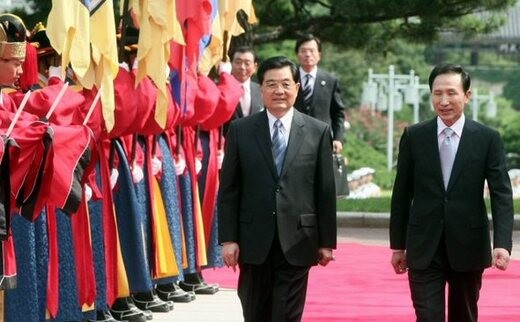hankyoreh
Links to other country sites 다른 나라 사이트 링크
[Editorial] Establishing true strategic relations with China

The Sino-Korean summit began in Seoul yesterday, the third since President Lee Myung-bak was inaugurated in February. Chinese President Hu Jintao chose Korea as his first foreign destination the day after the Beijing Olympics came to an end. The day before yesterday, August 23, was the sixteenth anniversary of the establishment of diplomatic relations between the two countries. This summit is rich in symbolic significance.
The substance of the joint statement, however, is nothing new. The basic framework of the statement is almost the same as the one released after the May summit in Bejing. The Lee administration says that this time the “strategic cooperative relationship” was made more specific, but other than strengthening cooperation in various areas, you do not see much that can be called “strategic.” All that catches your attention is the part about “holding high-level strategic dialogue between foreign ministries this year” and “more active high-level visits between military authorities.” The two sides have still failed to reach a conclusion on opening up a military hotline between the two militaries.
That the so-called strategic relationship is so unexciting is a reflection of the position each side finds itself in. When President Lee was in China for the last summit in May, the Chinese foreign ministry spokesman, speaking about U.S.-Korean relations, caused a stir by saying “Cold War era military alliances cannot solve regional security issues.” There was an effort to calm the waves that created, but China continues to be uneasy about the way the Lee administration places so much emphasis on Korea’s alliance with the United States. Meanwhile, during the Beijing Olympics there was a virtually unprecedented display of anti-Korean feeling by the Chinese. Koreans worry about increasingly prominent Sinocentrism. Both countries recognize each others’ importance, but elevating relations to a higher level anytime soon will not be easy.
A two-pronged approach will be necessary if Sino-Korean relations are going to develop into a strategic relationship that is true to name. First, Korea needs to stop expressing an excessive preference for the United States and engage in balanced diplomacy, and China needs to put to rest the concerns Asian nations have about its Sinocentrism. Mutual suspicion is not desirable for either side. Second, there needs to be much stronger cooperation and it needs to be substantial. More is better in exchange and cooperation in economic, social and cultural areas.
Korea and China did US$145 billion worth of trade last year, and by 2010, the 18th year of Sino-Korean relations, it will be US$200 billion. China is Korea’s largest trading partner and each year six million people travel between the two. The relationship is important, too, as it is necessary for resolving the North Korean nuclear issue and building a foundation for Korean reunification. A lot more work is needed than there is now if we are going to establish a strategic relationship with China.
Please direct questions or comments to [englishhani@hani.co.kr]
Editorial・opinion
![[Column] Park Geun-hye déjà vu in Yoon Suk-yeol [Column] Park Geun-hye déjà vu in Yoon Suk-yeol](https://flexible.img.hani.co.kr/flexible/normal/500/300/imgdb/original/2024/0424/651713945113788.jpg) [Column] Park Geun-hye déjà vu in Yoon Suk-yeol
[Column] Park Geun-hye déjà vu in Yoon Suk-yeol![[Editorial] New weight of N. Korea’s nuclear threats makes dialogue all the more urgent [Editorial] New weight of N. Korea’s nuclear threats makes dialogue all the more urgent](https://flexible.img.hani.co.kr/flexible/normal/500/300/imgdb/original/2024/0424/7317139454662664.jpg) [Editorial] New weight of N. Korea’s nuclear threats makes dialogue all the more urgent
[Editorial] New weight of N. Korea’s nuclear threats makes dialogue all the more urgent- [Guest essay] The real reason Korea’s new right wants to dub Rhee a founding father
- [Column] ‘Choson’: Is it time we start referring to N. Korea in its own terms?
- [Editorial] Japan’s rewriting of history with Korea has gone too far
- [Column] The president’s questionable capacity for dialogue
- [Column] Are chaebol firms just pizza pies for families to divvy up as they please?
- [Column] Has Korea, too, crossed the Rubicon on China?
- [Correspondent’s column] In Japan’s alliance with US, echoes of its past alliances with UK
- [Editorial] Does Yoon think the Korean public is wrong?
Most viewed articles
- 1[Column] Park Geun-hye déjà vu in Yoon Suk-yeol
- 2N. Korean hackers breached 10 defense contractors in South for months, police say
- 3Thursday to mark start of resignations by senior doctors amid standoff with government
- 4[Editorial] New weight of N. Korea’s nuclear threats makes dialogue all the more urgent
- 5Kim Jong-un expressed ‘satisfaction’ with nuclear counterstrike drill directed at South
- 6Will NewJeans end up collateral damage in internal feud at K-pop juggernaut Hybe?
- 7[Editorial] Japan’s rewriting of history with Korea has gone too far
- 8[Cine feature] A new shift in the Korean film investment and distribution market
- 9[Column] ‘Choson’: Is it time we start referring to N. Korea in its own terms?
- 10[Column] The clock is ticking for Korea’s first lady